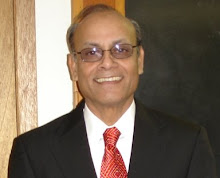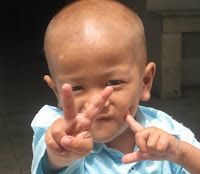On Saturday, November 14, accompanied by my two colleagues Megan Bradfield and Phil baker, I visited the HIV/AIDS project implemented by HKBP - the largest Lutheran Church in Asia. Our  first stop was to visit a Don Bosco school and then to a local prison where they work among the people who have been imprisoned for various crimes including drug abuse and sex offenses. We were very impressed with both of these visits.
first stop was to visit a Don Bosco school and then to a local prison where they work among the people who have been imprisoned for various crimes including drug abuse and sex offenses. We were very impressed with both of these visits.
As we came out of the prison, Megan asked me what was next. I replied  “lunch with sex workers”. Megan started laughing so loud that I wondered why she was laughing. Phil was curious too. I asked Megan why she was laughing, and she replied “Because you said “lunch with sex workers.” I said this was true and our next program is to have lunch with sex workers and drug abusers in a restaurant. Megan said “it was not because of what you said; I was laughing because the way you said it”.
“lunch with sex workers”. Megan started laughing so loud that I wondered why she was laughing. Phil was curious too. I asked Megan why she was laughing, and she replied “Because you said “lunch with sex workers.” I said this was true and our next program is to have lunch with sex workers and drug abusers in a restaurant. Megan said “it was not because of what you said; I was laughing because the way you said it”.
We were met by about a dozen men and women in the restaurant who came at the invitation of the HIV/AIDS staff. This was an incentive for them to come to talk to us. After lunch we went back to the project office to have a conversation with these people. To me, (and probably to my colleagues) this was the most emotional part of the visit. All of these men and women described their stories openly and were seeking help.
A man described that he was HIV positive and his wife was not only HIV positive, but she also had tuberculosis. They have four minor children; two of them were also HIV positive. He was in tears when he described that his wife was unable to work because of her poor health and that the entire family was dependent on his income alone. He told us how hard he works for a small income driving a mini cab as he pays major portion of his earnings to the owner of the mini cab. He told us that he is grateful for the treatment and care he receives from the HIV/AIDS project but asked if there was anything else we could do to help him to come out of this misery.
his income alone. He told us how hard he works for a small income driving a mini cab as he pays major portion of his earnings to the owner of the mini cab. He told us that he is grateful for the treatment and care he receives from the HIV/AIDS project but asked if there was anything else we could do to help him to come out of this misery.
A newly married couple told their story about how they realized that the husband was HIV positive immediately after their marriage. They do not want to have any children at this point. The wife told us that she is trying to support her husband and praying for his healing.
Two young women involved in sex trade told us about their painful stories. One of them was HIV positive. They told us the stories of how poverty and hunger brought them to this trade, and how they don’t like what they do but they do not have any other alternatives.
We left the meeting with much sadness as we could not give these people any immediate answer or hope for their future.
As we prepare to celebrate Christmas, with the abundance we enjoy in our lives, let us not forget the true meaning of the celebration – the birth of Jesus Christ, who came to this world, walked amongst the sick and the trodden, and died on the cross for us all. No matter what the politics of the Church, or differences we have among us, one issue remains a constant – there are many out there who need our help and our prayers. I pray that we all make a commitment for the upcoming New Year that we will come together as one and serve those who the world sees as “one of these leasts.”
 first stop was to visit a Don Bosco school and then to a local prison where they work among the people who have been imprisoned for various crimes including drug abuse and sex offenses. We were very impressed with both of these visits.
first stop was to visit a Don Bosco school and then to a local prison where they work among the people who have been imprisoned for various crimes including drug abuse and sex offenses. We were very impressed with both of these visits.












